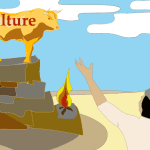David Bentley Hart offers a lively and wide-ranging defense of censorship in an article in the current issue of First Things . He savages the standard arguments against censorship: the slippery-slope argument (Hart: “Apparently, as a society, we are poised precariously upon the narrowest precipice of a sheer escarpment as smooth as class, overlooking a vast chasm of totalitarian tyranny; so much as a single step towards censorship will send us hurtling into the abyss, and nothing will be able to stay our fall”); the fear that philistines will take over the censorship apparatus (Hart: “it is not necessarily a bad thing for the artist who wishes to treat of things usually left decently veiled to have to submit his work to the ordeal of prevailing moral prejudice”). In the end, he worries that there judicious censors can still be found: “I do not believe that, if we were to create some sort of board of censors, we would be likely to suffer the reign of the American equivalent of Soviet realist art; but this is in part because the persons we would choose for the office might not be sufficiently sophisticated to rise to so plausible a level of philistinism. Simply said, it may be that we no longer have enough civilization to save.”
He reserves the worst argument for last: That censorship denies people what they want. “To find this a compelling argument,” Hart points out, one must already be convinced of the inalienable sanctity of choice, over against every other social good, and convinced, moreover, that freedom and choice are more or less synonymous.” The real problem is not censorship per se, but perverse ideas of liberty. Freedom, he argues, is not the ability to do whatever we choose, but is about the ability to flourish fully as the kind of thing it is. Freedom in this sense is not opposed to restraint; freedom in this sense requires restraint. Restraint of action and passion for the sake of honor or virtue liberates “from the momentary impulses and vain promptings of the will, and arrives at what can truly be called one’s essence.” True freedom is perfect restraint – Augustine’s non posse peccare. On a larger level, a society devoted to the preservation of libertarian freedom “must of necessity progressively conclude that all things should be permitted, that all values are relative, that desire fashions its own truth, that there is no such thing as ‘nature,’ that we are out own creatures.” Any society that “refuses all censorship is in some very crucial sense extremely unjust.”
Hart began his essay saying that “things could conceivably be far worse,” but the thrust of his analysis is that things are going to BE worse. And they could be worse because the apparent battle lines between the purveyors of indecency and the advocates of decency is a blurry one: Referring to Janet Jackson’s “costume malfunction” at this year’s Superbowl, Hart speculates, “I suspect that among those who professed their dismay at the halftime show there are many who as a rule are willing to tolerate most of the corrosive influences that invade family life – from advertising, films, popular music; the Internet, video games, the language we have all become accustomed to hearing every day ?Eso long as those influences continue unobtrusively to operate in their ‘proper’ places.” He suggests that “the true depth of our social division is . . . difficult to ascertain.” It is “only when we honestly ask ourselves what remedy we are willing to contemplate” that it becomes “clear whether as a people we are truly engaged in a ‘culture war’ . . . or are simply witnessing the effects of a genuine but transcient tension between more refractory and more energetic elements within a single cultural process.”
What to do? Hart suggests withdrawing from the bombardment of indecency that comes through the media, home-schooling and Christian schooling, cultivating “archaic enthusiasms.” And this: “Probably the most subversive and effective strategy we might undertake would be one of militant fecundity: abundant, relentless, exuberant, and defiant childbearing. Given the reluctance of modern men and women to be fruitful and multiply, it would not be difficult, surely, for the devout to accomplish ?Ein no more than a generation or two ?Ea demographic revolution.” This would place constraints on income and time, but “if it is a war we want, we should not recoil from sacrifice.”















